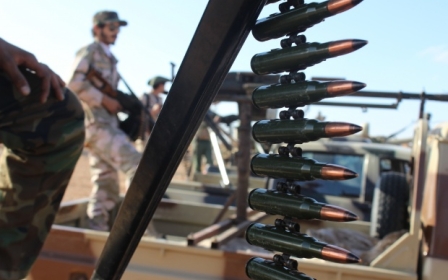Renewed fighting around Libya oil fields endangers peace process, warns UN

The United Nations has denounced renewed violence in Libya, saying bloody clashes over recent days undermine efforts to reach a political solution to the current crisis.
Despite the condemnation, violence continued on Wednesday, with eight Libyans killed during an attack on an oil field.
Two Ghanaian nationals and two people from the Phillipines were also killed, according to a government official who spoke to Sky News on Wednesday evening.
The attack came after 11 soldiers loyal to a Tobruk-based parliament were killed on Tuesday in the eastern town of Derna, after the army launched an offensive aimed at loosening the foothold of militants allied to Islamic State there.
Further west, the fighting intensified around the country’s oil fields, with attacks on oil fields and an attempted siege on the port town of Sidra.
Clashes between the Libyan army, a group allied to the House of Representatives, and an alliance of militia groups led to the evacuation late on Tuesday night of the al-Mabrouk oil field, jointly owned by Libya’s National Oil Company and French energy giant Total.
Four people were killed during the clashes, which came when an unidentified armed group attacked the field in Libya’s desert interior, some 100 kilometres south of the key port of Sidra.
A Libyan group allied to Islamic State claimed to have launched the attack, saying they had captured two “French crusaders” employed by Total during the storming of the facility.
However, the company flatly denied the claims, with a spokesperson saying on Wednesday that all Total staff had been withdrawn from the facility in 2013.
Further hours-long clashes broke out on Tuesday morning as militants attempted to seize control of Sidra, the coastal town that is home to Libya’s main oil export terminal.
Libya Dawn and al-Shorouk Operations, an outfit allied to Libya Dawn, are thought to have been behind the attack.
Eye-witnesses told local news site al-Wasat that 300 vehicles were involved in the attack, and that the militants “resembled an official army in terms of their logistical abilities and numbers”.
After the attack, army commander Colonel Ali al-Hassi confirmed that five of his soldiers had been killed and 13 wounded, releasing a video apparently filmed near to Sidra’s port to dismiss reports that the militants had gained control of the export hub.
Attacks on Libya’s oil installations were the main target of criticism from the UN, which on Wednesday released a statement saying the clashes “break…public pledges made by the main commanders to refrain from actions that could harm the political process”.
The statement reminded armed groups that the majority of Libyan citizens “want peace”.
Several of the groups engaged in fighting announced a ceasefire on 18 January, but violence broke out again shortly afterwards.
Stay informed with MEE's newsletters
Sign up to get the latest alerts, insights and analysis, starting with Turkey Unpacked
Middle East Eye delivers independent and unrivalled coverage and analysis of the Middle East, North Africa and beyond. To learn more about republishing this content and the associated fees, please fill out this form. More about MEE can be found here.




